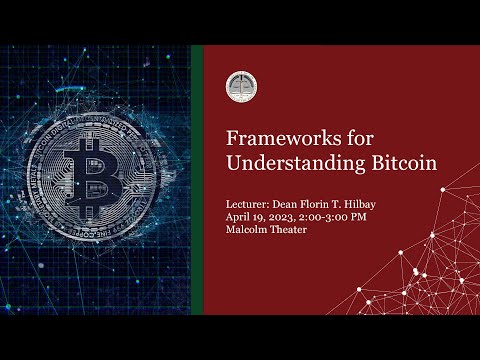[Long Reads] Ex SolGen Florin Hilbay: Bitcoin is Complex But Completely Understandable
Former Solicitor General of the Philippines, Florin Hilbay, discusses the potential of Bitcoin as a global reserve asset and alternative monetary system, emphasizing the importance of understanding its complexities.
![[Long Reads] Ex SolGen Florin Hilbay: Bitcoin is Complex But Completely Understandable 1 Photo for the Article - [Long Reads] Ex SolGen Florin Hilbay: Bitcoin is Complex But Completely Understandable](https://bitpinas.com/wp-content/uploads/2023/05/Former-SolGen-Hosts-Lecture-in-UP-on-Bitcoin-On-Law-Economics.png)
Subscribe to our newsletter!
- Former Solicitor General and Current Dean of Silliman University College of Law Florin Hilbay encourages understanding Bitcoin’s complexity, highlighting its immunity to inflation and potential as a global reserve asset.
- Hilbay differentiates between the fiat system and the Bitcoin system, describing the latter as a permissionless, separate monetary system.
- Despite concerns about central bank digital currencies (CBDCs), Hilbay argues that Bitcoin’s future will depend on the growth of its user base and its integration into global economies.
In a recent talk at the University of the Philippines Diliman College of Law, Florin Hilbay, former Solicitor General of the Philippines and current dean of the Silliman University College of Law, emphasized the importance of understanding Bitcoin and its potential impact on the global economy.
Addressing its complexity, he acknowledged that grasping the intricacies of Bitcoin requires a multidisciplinary approach, but insisted that gaining a deeper understanding would be key to realizing its potential as an alternative monetary system.
“Bitcoin is an insanely difficult topic to understand, even as it is in fact eminently understandable. It’s just that you need to spend the time to understand it. It’s a system that practically invites everyone to study it. It’s very difficult to understand because it’s inherently multidisciplinary. You need to go back to your history, your economics, your finance, your banking. You need to understand some coding, maybe some math as well as finance. Apart from that, You need to unlearn a lot of things.”
Read more: Dean Florin Hilbay on Bitcoin:
- Former SolGen, Silliman University is Releasing a Bitcoin Book
- Former Solicitor General Florin Hilbay Explains Why He is Bullish on Bitcoin
Bitcoin in the Academe
However, Hilbay, who holds an undergraduate degree in Economics, admitted that part of the Bitcoin community is “anti-university” because they see the university as simply an agent of the state and therefore part of the enemy. But for him, Bitcoin is an interesting topic because, from an academic standpoint, Bitcoin has the ability to integrate various disciplines and provide clarity to a lot of questions about politics and economics.
“In a few years’ time, we’ll move towards normality (of using BTC) as more and more people understand the use cases of Bitcoin. I think Bitcoin is one of those phenomena that you need to feel for yourself. For you to be able to understand it, it’s possible to study it from an academic standpoint at a distance, but the best way really to understand what it is and what it’s going to do to the world is by using it,” the lawyer explained.
BTC is Unaffected by Inflation
One of the benefits of BTC that Hilbay highlighted during his talk is its fidelity. It is because Bitcoin and fiat are two separate networks.
“When you say Bitcoin is volatile, that means you see Bitcoin in fiat terms, right? It actually went down from 69,000 in 2021 to 15,000. (Then you say,) ‘I am not going to put my money in such a volatile asset.’ That’s because you’re looking at it from the viewpoint of someone who’s within the fieldwork. It’s very difficult to think that way because most of us today still live in the fiat world. But there’s a growing community of people who are starting to live almost exclusively in this other universe, and they’re growing and growing and growing, and the only difference between them and the rest of humanity is knowledge,” he said.
According to the Silliman Dean, BTC is not affected by inflation because if a BTC holder owns 1 $BTC, from 2009 to today, that holder still owns 1 $BTC out of the 21 million BTCs in the Bitcoin universe today. This means that the number of BTC someone holds does not change even if its fiat value fluctuates significantly.
In the same talk, Hilbay urged the attendees to try to focus on the BTC network rather than the fiat price of a token because, from a network perspective, BTC is stable and not volatile because those 21 million Bitcoins are not changing and just going to stay there.
“And I’d like to think that the third cohort of non-bitcoiners will shift to this universe. And it’s a universe where no government can take your money away from you, where your money is really your money. Your work cannot be based on inflation, right? Where you can travel anywhere and everywhere with 12 words in your head,” he expanded.
BTC is a Separate Monetary System
The former SolGen also differentiated the BTC system from the fiat system:
“You have two monetary systems right now, the fiat system and the Bitcoin system. The fiat system is essentially the dollar system at the top. With all the other currencies trading against the dollar, the dollar is the most liquid.”
This is where Hilbay described fiat as “a form of money with a congenital disease,” and the congenital disease is inflation.
“It has to die because as the monetary units increase, that means that the value of the goods and services that it’s trying to measure is getting distorted, right? And if you have a form of money that is just like a mirror, perfectly able to reflect the value of the goods and services in that economy, people will shift to that system.”
The economist-turned-lawyer is describing Bitcoin as a permissionless system—an entirely separate monetary system by design. For him, the recent bank failures and near-death experiences of the traditional finance (TradFi) industry will lead the public to discover the Bitcoin system, which is not controlled and policed by the state.
BTC as Unit of Exchange
![[Long Reads] Ex SolGen Florin Hilbay: Bitcoin is Complex But Completely Understandable 8 Photo for the Article - [Long Reads] Ex SolGen Florin Hilbay: Bitcoin is Complex But Completely Understandable](https://bitpinas.com/wp-content/uploads/2023/05/Ex-Solgen-and-Siliman-Dean-Florin-Hilbay-Talks-About-Bitcoin-in-UP-06.png)
Mentioning BTC’s faster and cheaper transactions, Hilbay noted that BTC might soon become a global asset, not necessarily like any other currency, but a world reserve currency.
“We’ll start living by the Bitcoin standard, or on the Bitcoin standard, as more and more merchants start accepting Bitcoin, everything will be priced in Bitcoin. Uh, it depends also on how the states will react. If the states react in such a way as to try to ban the on-ramps and off-ramps, then they’re basically impaling themselves, right?” he explained.
Bitcoin becoming the global reserve asset and the world’s unit of account, according to Hilbay, might or might not happen, or it could also simply become a source of discipline for all government units.
However, the lawyer also insisted that every country in the world has made a mistake with respect to the choice of the global reserve asset, which has caused them to suffer economically and materially.
Thus, he emphasized the need to have a solid number of Bitcoin natives to produce a nation that is using the monetary system that will not collapse even if a war breaks out:
“My personal take is that slowly but surely, everyone will simply shift to a Bitcoin universe. And that transition will happen depending on the number of bitcoiners in every community. That’s why for me, it’s so crucial to build the human layer here in the Philippines, because if we’re able to understand this early enough, then the Filipinos will be protected when that transition happens. And it can happen anytime, given the pace and the intensity with China, the United States, China’s allies, and the United States’ allies, are projecting their forces.”
There is only one country that has officially legalized Bitcoin as a legal tender, and that is El Salvador.
BTC vs CBDC
Lastly, when asked about his opinion on how the central bank digital currencies (CBDCs) will erode BTC’s viability as a store of value and inflation-hedge, Hilbay admitted that it was a topic he preferred not to discuss.
But the Silliman Dean boldly claimed that nations are trying to shift to CBDCs right now because their fiat systems have failed and that their solution is to produce government-controlled cryptocurrencies, which are CBDCs:
“Maybe in 20 to 50 years, the biggest fight in the world will be Bitcoin versus central bank digital currencies. Why are nations trying to shift to a central bank digital currency? It’s because there’s something wrong with the fiat system. And as the fiat system is about to run out of breath, they will need to invent something new. And that is CBDCs, a cryptocurrency that can be used as a way to not only surveil you but after your behavior and regulate your behavior.”
As per Hilbay, there is a probability that governments will use CBDCs as a tool for enforcing a social credit system, especially for anti-government citizens, as the former can increase the interest rate on the latter’s loan, prevent them from having access to the financial system, and even exclude them from the rail system.
He also warned: “They can unpack you entirely. CBDCs will result in a digital panopticon, a world where all your transactions are policed by the state.”
This article is published on BitPinas: Ex SolGen Florin Hilbay: Bitcoin is Complex But Completely Understandable
Disclaimer: BitPinas articles and its external content are not financial advice. The team serves to deliver independent, unbiased news to provide information for Philippine-crypto and beyond.

![[Long Reads] Ex SolGen Florin Hilbay: Bitcoin is Complex But Completely Understandable 2 Photo for the Article - [Long Reads] Ex SolGen Florin Hilbay: Bitcoin is Complex But Completely Understandable](https://bitpinas.com/wp-content/uploads/2023/05/Ex-Solgen-and-Siliman-Dean-Florin-Hilbay-Talks-About-Bitcoin-in-UP-01-1.png)
![[Long Reads] Ex SolGen Florin Hilbay: Bitcoin is Complex But Completely Understandable 3 Photo for the Article - [Long Reads] Ex SolGen Florin Hilbay: Bitcoin is Complex But Completely Understandable](https://bitpinas.com/wp-content/uploads/2023/05/Ex-Solgen-and-Siliman-Dean-Florin-Hilbay-Talks-About-Bitcoin-in-UP-02.png)
![[Long Reads] Ex SolGen Florin Hilbay: Bitcoin is Complex But Completely Understandable 4 Photo for the Article - [Long Reads] Ex SolGen Florin Hilbay: Bitcoin is Complex But Completely Understandable](https://bitpinas.com/wp-content/uploads/2023/05/Ex-Solgen-and-Siliman-Dean-Florin-Hilbay-Talks-About-Bitcoin-in-UP-03.png)
![[Long Reads] Ex SolGen Florin Hilbay: Bitcoin is Complex But Completely Understandable 5 Photo for the Article - [Long Reads] Ex SolGen Florin Hilbay: Bitcoin is Complex But Completely Understandable](https://bitpinas.com/wp-content/uploads/2023/05/Ex-Solgen-and-Siliman-Dean-Florin-Hilbay-Talks-About-Bitcoin-in-UP-04.png)
![[Long Reads] Ex SolGen Florin Hilbay: Bitcoin is Complex But Completely Understandable 6 Photo for the Article - [Long Reads] Ex SolGen Florin Hilbay: Bitcoin is Complex But Completely Understandable](https://bitpinas.com/wp-content/uploads/2023/05/Ex-Solgen-and-Siliman-Dean-Florin-Hilbay-Talks-About-Bitcoin-in-UP-05-1.png)
![[Long Reads] Ex SolGen Florin Hilbay: Bitcoin is Complex But Completely Understandable 9 Photo for the Article - [Long Reads] Ex SolGen Florin Hilbay: Bitcoin is Complex But Completely Understandable](https://bitpinas.com/wp-content/uploads/2023/05/Ex-Solgen-and-Siliman-Dean-Florin-Hilbay-Talks-About-Bitcoin-in-UP-07.png)
![[Long Reads] Ex SolGen Florin Hilbay: Bitcoin is Complex But Completely Understandable 10 Photo for the Article - [Long Reads] Ex SolGen Florin Hilbay: Bitcoin is Complex But Completely Understandable](https://bitpinas.com/wp-content/uploads/2023/05/Ex-Solgen-and-Siliman-Dean-Florin-Hilbay-Talks-About-Bitcoin-in-UP-08-1.png)
![[Long Reads] Ex SolGen Florin Hilbay: Bitcoin is Complex But Completely Understandable 11 Photo for the Article - [Long Reads] Ex SolGen Florin Hilbay: Bitcoin is Complex But Completely Understandable](https://bitpinas.com/wp-content/uploads/2023/05/Ex-Solgen-and-Siliman-Dean-Florin-Hilbay-Talks-About-Bitcoin-in-UP-09.png)





